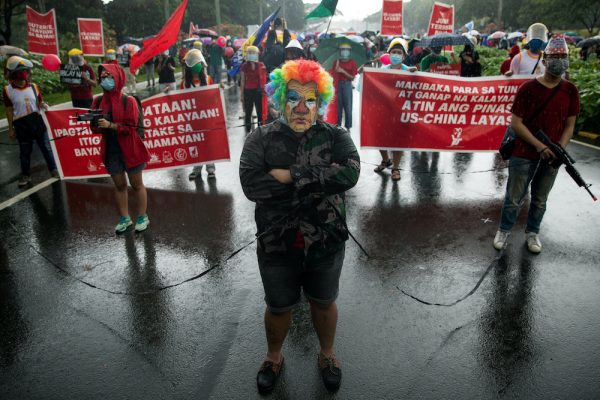Supporters argue the ATA is essential for national security while opponents condemn it as another attack on civil rights, on top of the selective and discriminatory enforcement of quarantine measures during COVID-19. The UN Human Rights Council weighed in on the legislation, stating that the Act would dilute the Philippines’ human rights safeguards. Despite assurances from government officials, the legislation blurs the distinction between acts of protest and terrorism and makes the executive branch the primary arbiter of interpreting that distinction.
The Duterte administration has institutionalised the legal prosecution of activism and dissent through its ‘whole of nation approach’ to counter-terrorism, which is aimed at defeating the nation-wide insurgency fought by the New People’s Army — the armed wing of the Communist Party of the Philippines. Arrests and extrajudicial killings of activists accused of communist sympathies have become increasingly commonplace under this legal regime.
Even the country’s largest media companies are under threat. The Duterte administration forced the media giant ABS–CBN to lapse its television broadcasting rights. The President’s National Task Force to End Local Communist Armed Conflict defended the move by accusing the company of propagandising on behalf the Communist Party of the Philippines. Armed with the ATA, the Duterte administration can officially designate dissenters as terrorists, escalating the persecution of journalists and activists.
Section four of the ATA states that ‘terrorism shall not include exercises of civil and political rights that are not intended to cause death, serious physical harm or create a serious risk to public safety’. But there is no clarification of what ‘a serious risk to public safety’ entails, meaning that activists and protestors could be charged based on this and subsequent sections of the Act. Further sections criminalise planning, training, preparing, facilitating, inciting and recruiting in support of terrorism by defining them as ‘preparatory acts’ for which individuals can be charged.
The ATA also diminishes the rights of suspects believed to be violating the law by eliminating a clause in the HSA entitling those wrongfully detained to financial damages, extending permissible periods of warrantless detention, expanding surveillance and limiting the liability of soldiers and police for their actions.
Even more worryingly, the ATA empowers the executive branch to designate terrorist organisations and individuals through the Anti-Terrorism Council (ATC) that is staffed by members appointed by the executive. This supersedes HSA section 53, which prevented the Anti-Terrorism Council from exercising any judicial authority.
Of the sections repealed or otherwise amended by the ATA, the removal of HSA section 53 presents the most serious challenge to human rights in the Philippines. Equipped with the power to designate terrorist organisations and individuals engaging in vaguely-defined preparatory acts, the ATC will have free reign to designate civil society groups, activist networks and associated individuals as ‘terrorists’.
Such powers are to be exercised with tokenistic oversight from the newly revised Joint Oversight Committee established by the HSA and amended by the ATA. The revised committee comprises six members from each chamber of Congress. But committee oversight only entails the power to summon ATC members for questioning and the ability to produce ad hoc and annual reports regarding the implementation of the law.
This stands in contrast to the original, albeit still limited, authority of the Joint Oversight Committee in the HSA, requiring summoned members of the ATC to provide written reports of their actions on request. It also encouraged the Committee to produce recommendations for amending or repealing sections of the HSA. With its already limited authorities degraded by the ATA, the Committee will be hard pressed to hold the ATC accountable.
The ability of the Commission on Human Rights (CHR) to challenge the authority of the ATC and implementing agencies is similarly circumscribed by the ATA. The CHR no longer has the remit to prosecute public officials, law enforcement and other persons suspected of violating the civil and political rights of a person suspected of a terrorism-related crime under the ATA. The Act stipulates the CHR shall give the highest priority to the investigation and prosecution of violations of civil and political rights of persons in relation to the implementation of the ATA.
By sidelining the CHR, diluting the Joint Oversight Committee and empowering the ATC to designate terrorist organisations and individuals without a formal system of oversight and judicial review, the passage of the ATA could become a defining moment in the gradual process of constitutional retrogression by the Duterte Administration.
But while the ATA is provoking considerable backlash, including a forthcoming legal petition to be filed with the Supreme Court, its passage faces few obstacles within the government and will automatically lapse into law 30 days after it is received by the President.
Even if the President heeds public opposition and vetoes the bill, the broad coalition of officials supportive of the ATA are likely to press for its revision and revival, ensuring that the debate over counterterrorism in the Philippines will not subside.
Luke Lischin is an assistant research fellow at the National War College, Washington DC, and an independent consultant on political violence in Southeast Asia.
The opinions expressed in this article are the author’s own and do not necessarily reflect the views of the National War College.

